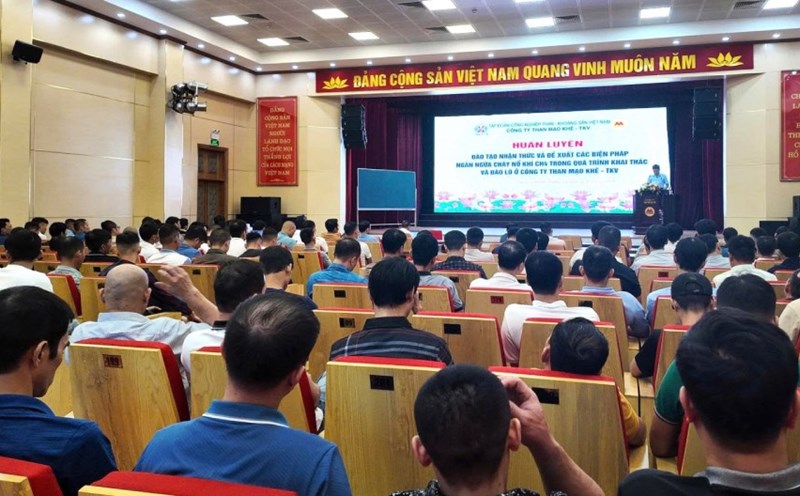Workers - Creators and Contributors to Innovation
The transformation journey of the Vietnamese economy over the past three decades has witnessed profound changes, from a focused planned economy to a socialist-oriented market economy. The success of this transformation process cannot be without the important contributions of the workforce, who directly create material wealth for society. However, in the context of industrialization and modernization of the country today, the role of workers has changed, requiring a deep intellectualization to meet the development requirements of the times.
Previously, Vietnamese workers were mainly seen as manual laborers, working in production lines or construction sites. However, as the economy moves to the stage of industrialization, modernization and digital transformation, the role of workers is no longer limited to operating machinery but requires them to possess new skills and knowledge to adapt to modern technologies.
The fourth industrial revolution, with the strong development of automation, artificial intelligence and robots, requires the workforce to not only work with automated equipment but also have the ability to be creative, improve and develop technology. This requires workers to be equipped with digital knowledge, creative thinking, problem-solving skills and self-study ability.
In Resolution 57 of the Politburo, one of the key contents is the proactive participation of workers in the process of creating and innovating technology. These are not only workers working in factories and industrial parks, but also those who directly participate in research, improvement and development of production processes. Workers are not only the ones to "operate the equipment" but also the ones to discover problems, come up with innovation initiatives and even participate in creating new technologies.
Workers' creativity is not only limited to improving the production process but can also expand to the fields of scientific and technological research. Workers, with the ability to have a deep understanding of the production process and actual operations, can play an important role in developing new technological solutions, thereby promoting the development of the knowledge economy.
Resolution 71 - lays the foundation for developing a highly skilled workforce
Resolution 71-NQ/TW dated August 22, 2025 of the Politburo on breakthroughs in education and training development, although not directly raising the issue of educating workers and laborers in the new period, has become the foundation for building a new generation of Vietnamese people with patriotism and national pride, enough courage, intelligence, capacity, qualifications, and health to meet new requirements, including the current and future labor force.
Resolution 71 points out: riding on education and training must ensure learning goes hand in hand, theory is associated with practice, schools are associated with society. Preschool and general education is the foundation for forming personality, developing the qualities and abilities of learners. Vocational education plays a key role in developing a highly skilled workforce. Higher education is the core to developing highly qualified and talented human resources, promoting the development of science, technology and innovation".
In the context of the 4.0 industrial revolution and the knowledge economy, workers will continue to play the role of a key force, holding the key to development. To realize this vision, it is necessary to have worthy investment in training, support policies and mechanisms to encourage creativity in the working community, helping them not only become a strong labor force but also an important source of motivation for the development of Vietnam's knowledge economy.
The role of trade unions in supporting workers' intellectualization
Trade unions play a key role in supporting the process of educating workers. As a representative of the rights of workers, the trade union not only protects the rights but also promotes training policies, improving qualifications and skills for workers. Trade unions need to proactively coordinate with businesses and the State to organize digital skills training courses, from the use of smart devices to knowledge about information security, data and innovation.
In addition, the trade union is also a bridge between workers and leaders at all levels in reflecting requirements and aspirations about rights, treatment regimes as well as opportunities for learning and development. Promoting the creative emulation movement in workshops, teams, and industrial parks will create a solid foundation for the application and development of science and technology from the grassroots.
The intellectualization of workers is not only a goal of the working class but also a strategic requirement of the country. To realize the goal of industrialization and modernization of the country, it is necessary to build a workforce that is both strong in labor force and knowledge, capable of mastering technology, creating innovative solutions and quickly adapting to changes in the international labor market.
This requires strong support from the State, enterprises and trade unions in creating an environment for learning, training and skills development for workers. Workers not only need to learn to work but also need to learn to be creative, thereby contributing to the development of the country.
Some indicators in Resolution 71 related to the labor force
By 2030: Building and training human resources, especially high-quality human resources, to meet the requirements of Vietnam becoming a developing country with modern industry and high average income. The network of higher education and vocational education institutions is arranged appropriately and invested in upgrading; strive for 100% of higher education institutions and at least 80% of vocational education institutions to meet national standards, 20% of institutions to be modernly invested equivalent to developed countries in Asia.
The rate of workers with college and university degrees or higher is 24%. The rate of learners in basic science, engineering and technology subjects will reach at least 35%.
By 2045: Vietnam has a modern, fair and quality national education system, ranking among the top 20 countries in the world. Every citizen has the opportunity to study for life, improve qualifications, skills and maximize personal potential. High-quality human resources, scientific and technological talents become the core driving force and competitive advantages of the country, contributing to making Vietnam a developed country with high income.












